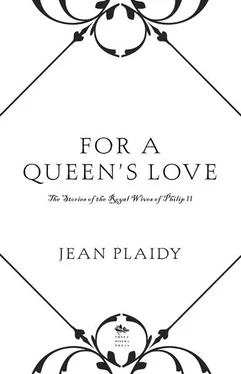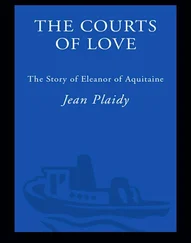Jean Plaidy - For a Queen's Love - The Stories of the Royal Wives of Philip II
Здесь есть возможность читать онлайн «Jean Plaidy - For a Queen's Love - The Stories of the Royal Wives of Philip II» весь текст электронной книги совершенно бесплатно (целиком полную версию без сокращений). В некоторых случаях можно слушать аудио, скачать через торрент в формате fb2 и присутствует краткое содержание. Жанр: Старинная литература, на русском языке. Описание произведения, (предисловие) а так же отзывы посетителей доступны на портале библиотеки ЛибКат.
- Название:For a Queen's Love: The Stories of the Royal Wives of Philip II
- Автор:
- Жанр:
- Год:неизвестен
- ISBN:нет данных
- Рейтинг книги:5 / 5. Голосов: 1
-
Избранное:Добавить в избранное
- Отзывы:
-
Ваша оценка:
- 100
- 1
- 2
- 3
- 4
- 5
For a Queen's Love: The Stories of the Royal Wives of Philip II: краткое содержание, описание и аннотация
Предлагаем к чтению аннотацию, описание, краткое содержание или предисловие (зависит от того, что написал сам автор книги «For a Queen's Love: The Stories of the Royal Wives of Philip II»). Если вы не нашли необходимую информацию о книге — напишите в комментариях, мы постараемся отыскать её.
For a Queen's Love: The Stories of the Royal Wives of Philip II — читать онлайн бесплатно полную книгу (весь текст) целиком
Ниже представлен текст книги, разбитый по страницам. Система сохранения места последней прочитанной страницы, позволяет с удобством читать онлайн бесплатно книгу «For a Queen's Love: The Stories of the Royal Wives of Philip II», без необходимости каждый раз заново искать на чём Вы остановились. Поставьте закладку, и сможете в любой момент перейти на страницу, на которой закончили чтение.
Интервал:
Закладка:
Philip stopped reading.
To leave Spain! To leave Carlos, who needed his discipline? To leave Doña Isabel and her two boys who gave him all the solace he needed when he escaped from his affairs of state, to face the Cortes and tell them that he was to follow his father abroad … he did not like it. And Spain would not like it either.
He guessed that one subject his father wished to discuss in private was another marriage for him. He had been a widower too long.
He did not want his life to be disturbed; yet if it was his duty to leave his country and to travel in foreign lands, to take a woman whom he did not want to be his wife, he would do that duty, as he always had.
Valladolid was preparing for fiesta . The marriage of the Emperor’s daughter Maria to her cousin Maximilian was to be celebrated with even more pomp and splendor than was usual on such occasions; the populace must be appeased. The Cortes had protested against the departure of the heir to the crown; its members had even written to the Emperor begging him not to take Philip from Spain. Some of the statesmen had been outspoken: they had declared that the Emperor was ruining Spain with his campaigns abroad, and they wished to be ruled by a king, not an emperor.
Philip had faced them, calm and resigned. He had no wish to leave Spain; but if it was his father’s desire that he should, then that must be fulfilled.
When he had left the Cortes he had gone to Isabel’s house. She was waiting for him. The baby was a fine child, growing up like his brother, and it was a great pleasure to be with them. There was peace in Isabel’s room; he could sit beside her, watching the children playing at their feet. If only he might enjoy domestic happiness! But even now, at this moment, he must break the news of his departure.
“My father has sent for me, Isabel, and I may be away from you for a long time.”
She turned to him and, as that control which she had taught herself broke suddenly, she laid her face against his shoulder and began to cry quietly.
Philip was deeply moved, as he always was by a display of affection toward himself. “Isabel,” he said. “Isabel … my love.”
She spoke fiercely against the Emperor. “But why should you go? You are needed here. Are you going to be away from us forever … as the Emperor has always been? The people will not endure that. You must not go, Philip. Oh, you must not go.”
He stroked her hair; he dared not speak for fear of showing her his distress.
Little Garcia came and stood before them, looking wonderingly at his mother. “What ails her, Father?” he asked.
Philip took the boy on to his knee. The baby stopped kicking as he lay on his cushions. When he saw their tears he let out a loud wail.
His mother went to him and picked him up; she sat with him on her knee, hiding her own grief in her effort to comfort the child.
“Father,” insisted Garcia, “what is wrong, then?”
His mother answered for Philip. “It is nothing to be sad about. But … your father has to go away for a time.”
“For a long time?”
“It will not be longer than I can help,” said Philip.
“You will come back soon,” said the boy.
They sat for a while in silence, the boy looking from the face of one parent to the other’s. The baby put out a fat hand and grasped at a bright ornament on his father’s doublet.
It seemed to Philip a scene of charming domesticity, saddened only by his impending departure. Oh, how happy he might have been had he not been born the Prince of Spain!
While the festivities which followed the wedding of Maximilian and Maria were still in progress, Philip left Valladolid on the first stage of his journey.
His departure took some of the merrymaking out of the revels, for even to the people in the streets he was the beloved Prince. The Emperor might be a foreigner, but Philip was one of themselves; they liked his quiet dignity, his Spanish haughtiness; they had never heard of any indiscretion on his part, and even his love affair with Isabel Osorio was conducted with decorum, and it was said—and all believed this—that Philip behaved like a respectably married man in his relationship with Doña Isabel, whereas his father’s love affairs were mainly with foreign women.
Still, if they loved their Prince, they also loved merrymaking, and what good could they do by grieving?
On that October day, as Philip left Valladolid followed by a magnificent retinue to ride through Aragon and Catalonia, the people lined the streets and cried Godspeed and a quick return.
One woman watched him from her window. She held up her elder son that he might see his father, for she knew, though she did not tell the boy this, that it would be a year or two before they saw Philip again.
Was Philip aware of them as he rode past Isabel’s house? She knew that he was, and she knew that he longed to turn and take one last look at the house in which he had known great happiness. But he did not turn his head to look. Not for one instant, however great the provocation, would he forget the decorum due to his rank.
Yet he had taken a public farewell of Carlos. He had lifted the sullen boy up that the crowds might see him, and he had solemnly kissed the unresponding lips. Carlos had enjoyed the ceremony, caring nothing for his father’s departure.
Philip had said to him when they were alone: “I shall not see you for a long time, Carlos. I want you to promise me to be good and try to learn your lessons.”
Carlos had said nothing; he merely gave his father that long, cunning stare.
“You must be good, my son, for, with your grandfather and your father away from Spain, you have a special duty to your people. You must show an example to all.”
The boy continued to scowl; he did not like this talk of being good.
“You must make the people love you. You must, by your behavior, win the respect of your grandfather and father.”
Then Carlos spoke. “Juana loves him. Juana loves the little one.”
Philip rode through Catalonia to the Bay of Rosas, where Admiral Doria met him with fifty-five galleys and many sailing ships; and Doria fell on his knees before the Prince and, with tears streaming down his cheeks, cried: “Now, O Lord, let thy servant depart in peace, for his eyes have seen Thy salvation.” Philip knew that the emotion of Doria was genuine; to him the Prince was like a god; and the Admiral reflected the mood of the entire Spanish nation.
This was gratifying indeed. His people—the Spanish—loved him; not as he craved to be loved, but as a ruler; his manners, which repelled in private, pleased in public. He had this devotion and he had the love of Isabel and their children to sustain him. Should he not be gratified?
But whatever he had, he would never forget that first he was a Prince, and, as he listened to the compliments that were showered upon him, as he heard the cheers of the people, he could not shut out of his mind the memory of that dark, lowering face; he could hear the peevishly triumphant whine: “Juana loves him. Juana loves the little one.”
And although he had given Spain his life to make of it what his people wished, he had also given them Don Carlos.
He passed through Genoa to Milan and Mantua.
The Italians did not like him. They were courteous, paying him the respect which was his due; but he, as much as any, was aware of the impression he made.
“He is serious, this Philip,” it was said. “Has he never learned to laugh and compliment the ladies?”
They talked of his father. There was a man! It was good to watch him at table and to mark his way with women. He was a man such as the Italians could understand.
Читать дальшеИнтервал:
Закладка:
Похожие книги на «For a Queen's Love: The Stories of the Royal Wives of Philip II»
Представляем Вашему вниманию похожие книги на «For a Queen's Love: The Stories of the Royal Wives of Philip II» списком для выбора. Мы отобрали схожую по названию и смыслу литературу в надежде предоставить читателям больше вариантов отыскать новые, интересные, ещё непрочитанные произведения.
Обсуждение, отзывы о книге «For a Queen's Love: The Stories of the Royal Wives of Philip II» и просто собственные мнения читателей. Оставьте ваши комментарии, напишите, что Вы думаете о произведении, его смысле или главных героях. Укажите что конкретно понравилось, а что нет, и почему Вы так считаете.












